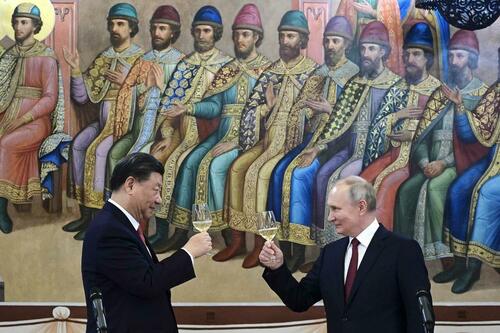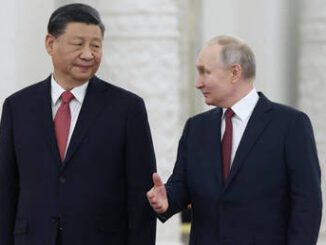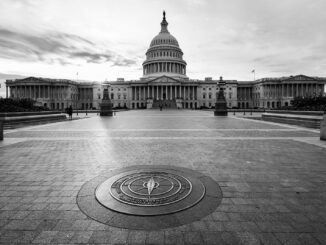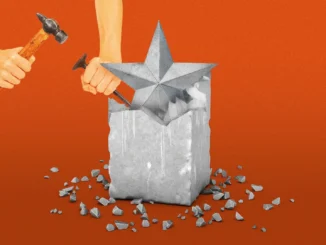
China’s President Xi Jinping has arrived back in Beijing after his two-day visit with President Vladimir Putin over the China-proposed Ukraine peace plan. On the Ukraine crisis, there was nothing that can be considered a breakthrough, but the talks did prompt swift reaction from Washington.
More important are the broader implications of the two ‘dear friends’ pledging to shape a new world order and signing multiple pacts on economic, technological, and strategic cooperation. These were the words captured in a Reuters headline Wednesday… “China’s President Xi Jinping and Russia’s President Vladimir Putin set their sights on shaping a new world order as the Chinese leader left Moscow, having made no direct support for Putin’s war in Ukraine during his two-day visit.” Arguably the most important exchange came during the sendoff before Xi’s entourage headed to the airport, and was captured by (or rather intended for) the cameras…
Xi Jinping: “Change is coming that hasn’t happened in 100 years and we are driving this change together.”
Putin: “I agree.”
Putin had told Xi that the peace plan “correlates to the point of view of the Russian Federation”; but the message out of Biden officials was “don’t be fooled” as it’s all about Moscow seeking to “freeze the war on its own terms,” in the words of Secretary of State Blinken. Also on Tuesday, NSC spokesman John Kirby said China is not an impartial mediator and that China “keeps parroting the Russian propaganda”.
On Wednesday the Chinese foreign ministry hit back, charging that Washington is “adding fuel to the fire” of the conflict by its “continuous supply” of weapons to the battlefield. Spokesman Wang Wenbin was asked directly about Kirby and Blinken’s comments from the day prior.
“The US side claims that China’s stance isn’t impartial. But is it impartial to continuously supply weapons to the battlefield? Is it impartial to constantly escalate the conflict? Is it impartial to allow the effects of the crisis to spill over globally?” Wang said.
“We advise the American side to rethink its own stance on the Ukraine issue, turn away from the erroneous path of adding fuel to the fire, and stop shifting the blame to China,” he added. The spokesman further insisted Beijing has “no selfish motives on the Ukraine issue, has not stood idly by… or sought profit for itself,” but that “what China has done boils down to one thing, that is, to promote peace talks.”
He went on to assert that contrary to popular assumptions in the West, the global community stands by China on the side of diplomatically pursuing peace. According to a transcript:
On the Ukraine issue, voices for peace and rationality are building. Most countries support easing tensions, stand for peace talks, and are against adding fuel to the fire. This is also China’s position. President Xi Jinping’s visit to Russia is a journey of friendship, cooperation and peace. It has been warmly received internationally. We call on the US to reflect on its own role in the Ukraine issue, stop fueling the flames, and stop deflecting the blame on China.
AP image: a toast during this week’s summit in Moscow.
Wang spelled out that “We will continue to stand firm on the side of peace and dialogue and on the right side of history and work together with the rest of the world to play a constructive part in facilitating a political settlement of the Ukraine issue.”
To the surprise of many, Ukraine’s President Zelensky on Tuesday invited China to start talks on a path forward based on offering a “Ukraine formula” for peace negotiations. It’s unclear what Beijing’s response will be, but it was widely seen as an unexpected and positive overture. It has also become clear that whatever peace talks might come to fruition involving China mediation, the US is not going to lead, but will likely be sidelined – despite the closeness to Kiev.
Below, Rabobank gives hard-hitting commentary on the overall implications of the Xi-Putin meeting, and the rapidly bifurcating world driven by Russia and China increasingly uniting against their common enemy the United States.
* * *
For a strident view on the Putin-Xi meeting and its broader implications, @samagreene, professor at the Russia Institute at King’s College London, notes:
“…China’s domination of Russia is complete. Xi praised Putin, touted strong relations with Russia, unity in the UNSC, and promised coordination on IT and natural resources trade. And that’s it. Putin, by contrast, was almost obscenely generous – and not just with his praise…. He pledged completion of the Strength of Siberia 2 pipeline… [which] replaces structural dependence on Europe with structural dependence on China, at a time when Russia is a price taker for hydrocarbons. That’s a strategic win for China.
Further, Putin announced a reorientation of agricultural trade towards China and a strategic role for China in developing Russia’s far east and high north – a move Putin’s own security apparatus has long resisted (for obvious reasons). Again, strategic wins for China… And Russia offered Chinese companies first dibs on the assets of departing Western companies – again strengthening China’s presence in Russia, with no reciprocal strengthening of Russia’s presence in China…
While there were undoubtedly agreements we are not meant to know about, there is no indication here of a significant increase in military support for Russia – nor even of a willingness on Xi’s part to ramp up diplomatic support. A swing and a miss for Putin…
Putin greeted Xi with a rhetorical bear hug. Xi gave Putin a pat on the head and told him to run along now and play… Putin tells his people he’s fighting for Russia’s sovereignty. In truth, he’s mortgaged the Kremlin to Beijing. The question now is one for Xi: What will he do with his newest acquisition?”
That leaves the EU facing a two-for-one in Russia and China, and as Politico notes, ‘Europe’s China policy will shape transatlantic relations‘. The implication is large German firms lean on the large German government, “putting Europe’s priorities on a likely collision course with US strategic goals, which will focus on confronting China in economic, military and, increasingly, ideological domains.”
On which, US historian Kotkin says, “So I’m in love with the Cold War. I’m in favour of the Cold War. The Cold War is not only a good thing – it’s a necessary thing, because we have to uphold…the terms of the way we share the planet…. You know, I hear a lot of people saying, “Oh my God, no Cold War with China. God forbid we should have a Cold War with China.” And I think to myself, “What world do these people live in?” First, we’re already in a Cold War with China, because China started that long before we understood that that’s what they were doing. And secondly, would you prefer a hot war? The alternative to Cold War is capitulation– which you can imagine I’m not in favour of– or hot war.”
Yet maybe the EU is feeling Cold too. As @Schuldensuehner points out, China is losing importance as a German export destination: February exports to it were -12.4% while those to the US were +19%, making it by far the most important market, as well as supplying key LNG imports (and Fed swaplines); France is number two, far ahead of China. Moreover, Germany is considering China export restrictions similar to those of the US, according to its economy minister, who adds, “We have to prevent losing our technology leadership because we don’t look closely.” Notably, China just threated the Netherlands over its tech export controls (“This will not be without consequences. I’m not going to speculate on countermeasures, but China won’t just swallow this.“): how long until the same message is heard in Berlin?
A bifurcating world like this only complicates real economy investment decisions, supply chain issues, and monetary policy decisions.
Loading…



